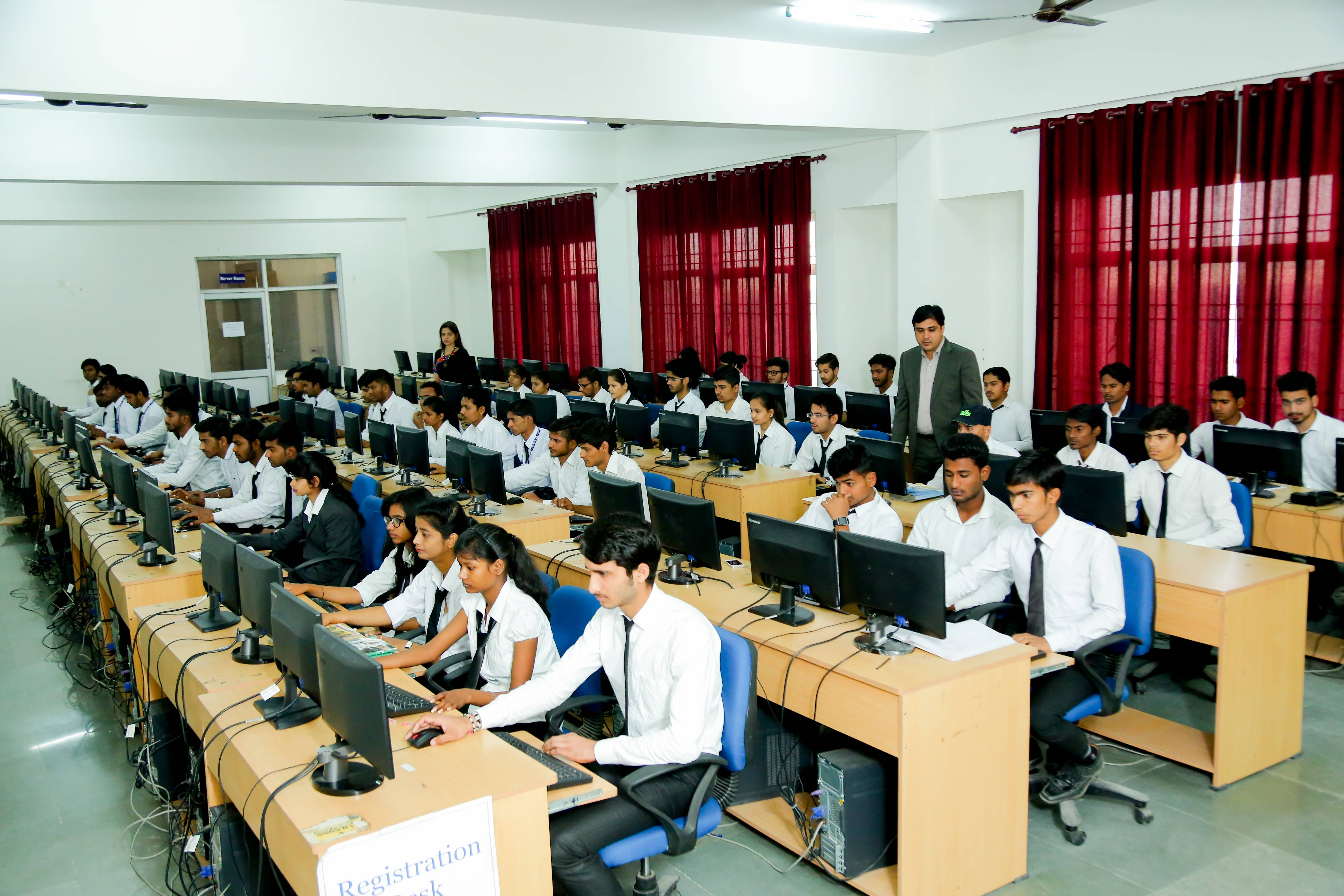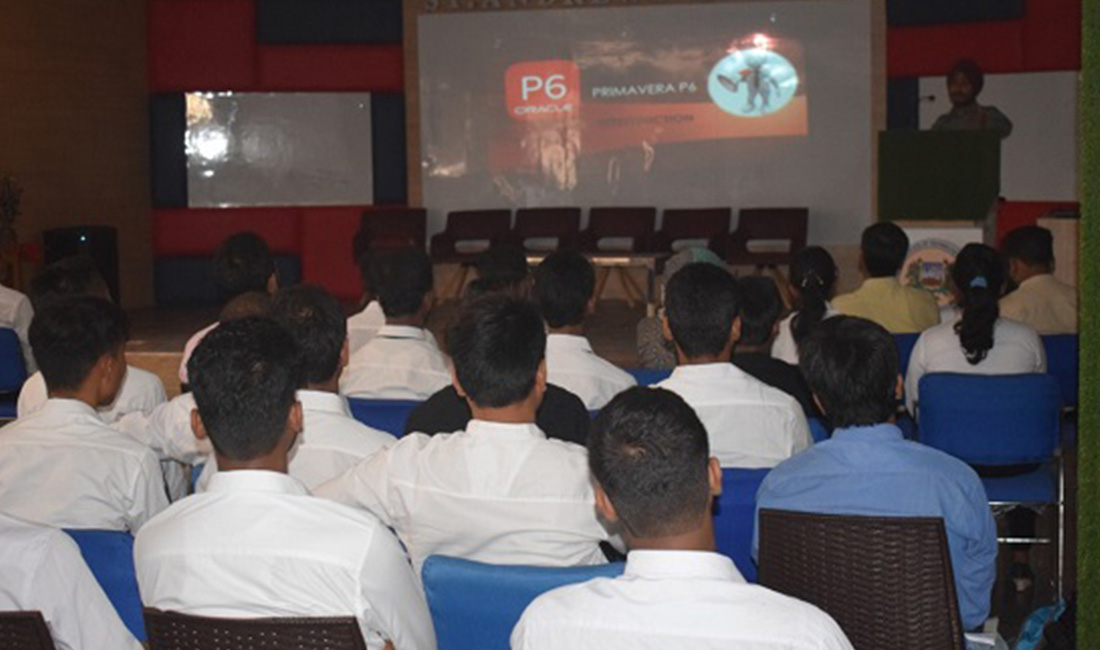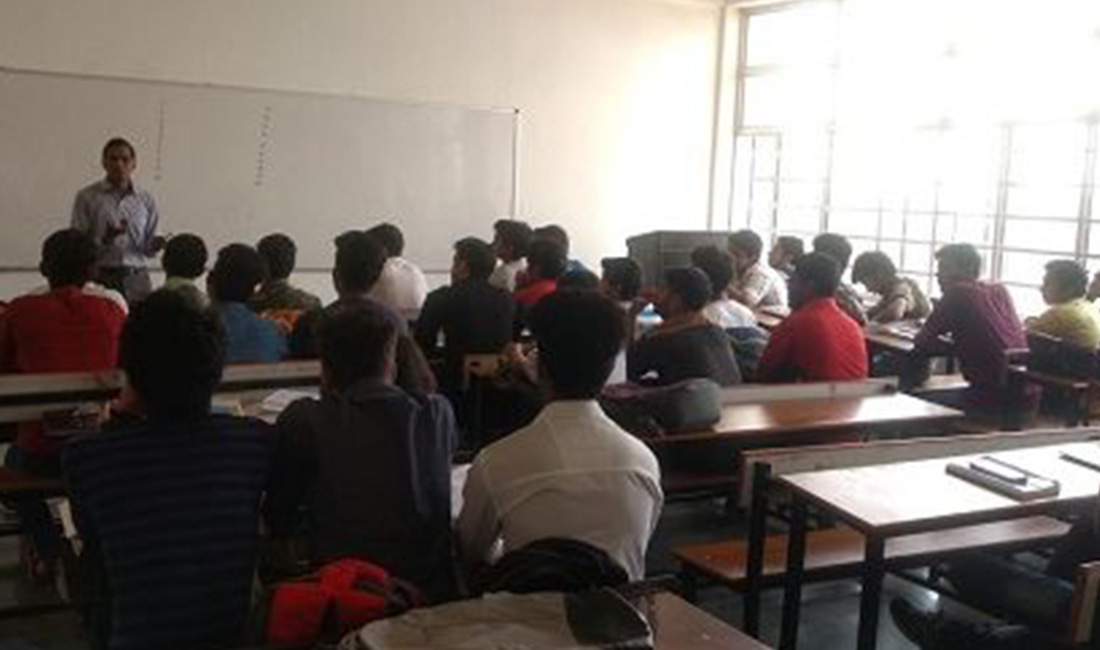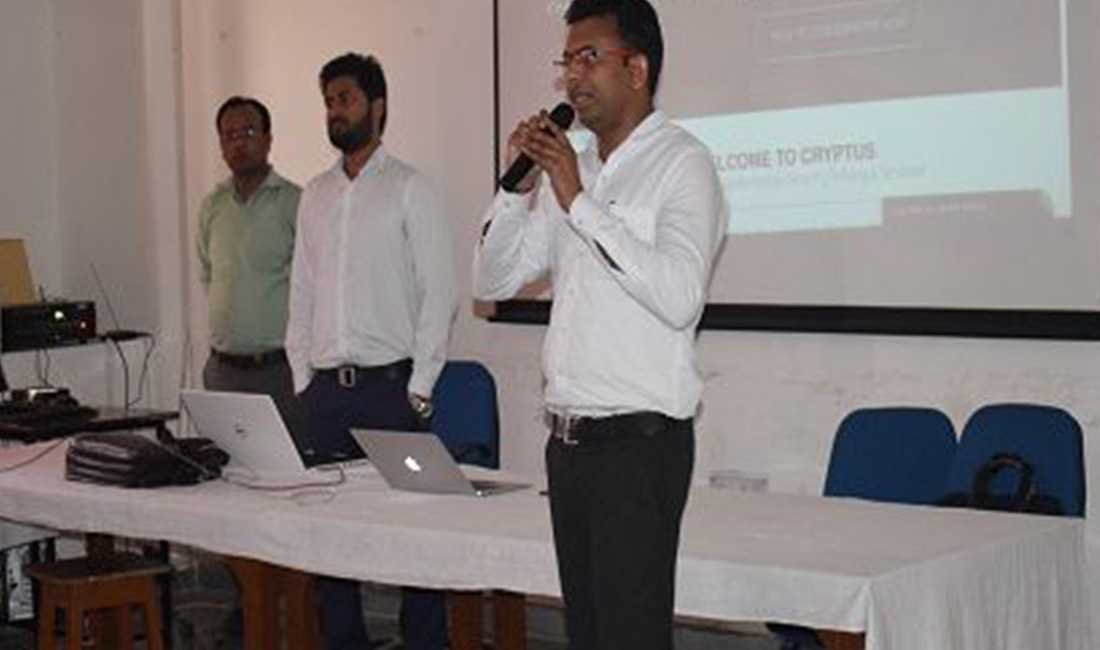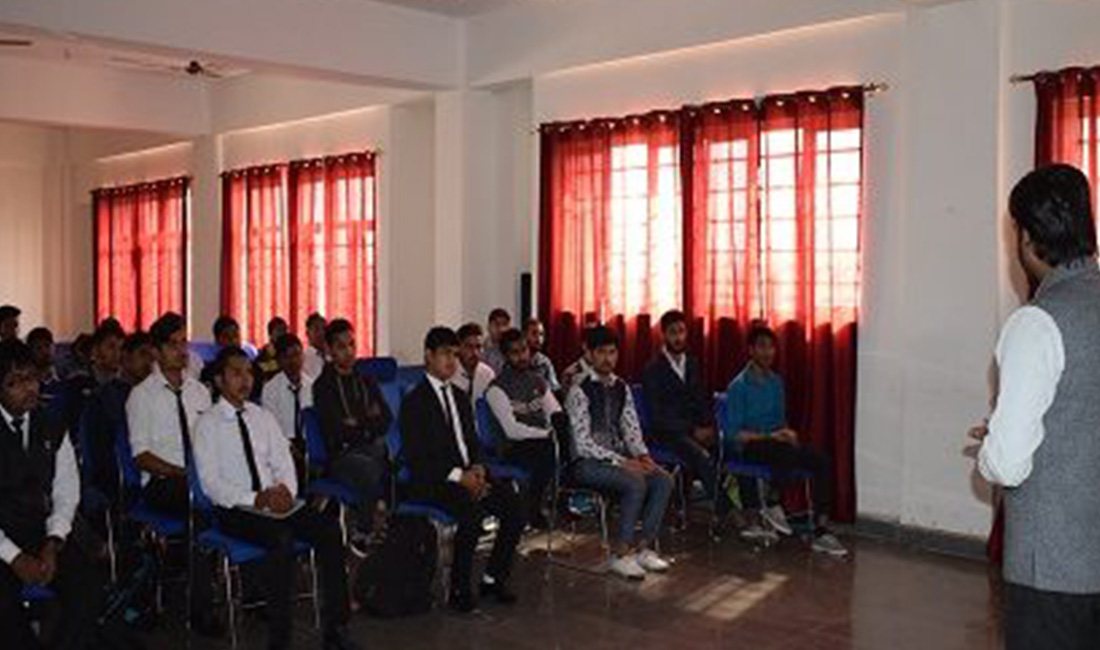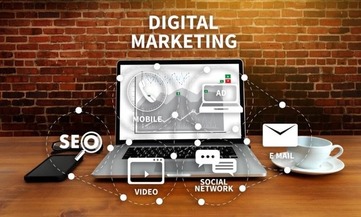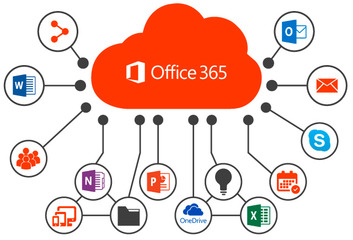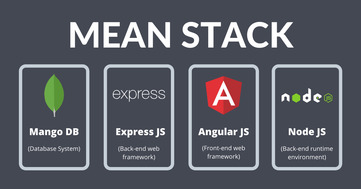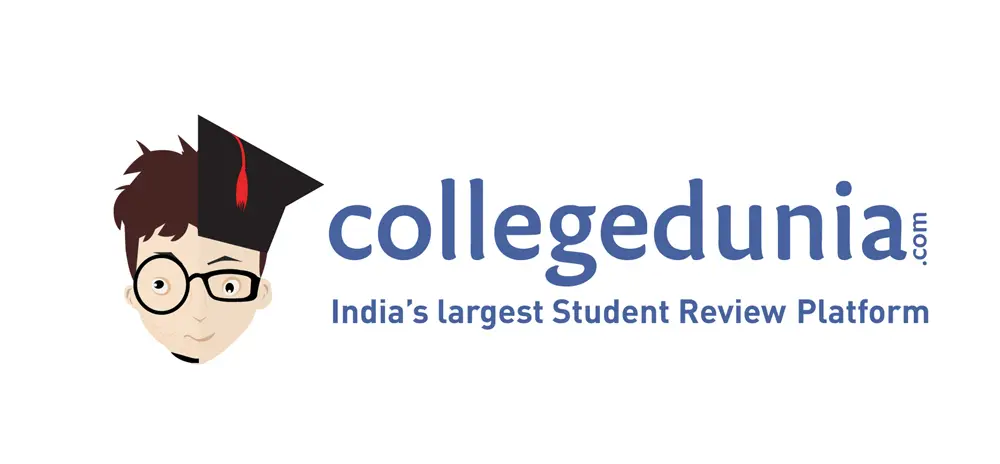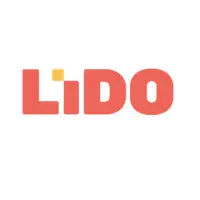Lle tela amin feuya

Select Page
B.Tech - Computer Science & Engineering (CSE)
4 Years course - Approved by AICTE
B.Tech in Computer Science and Engineering (CSE) is more than just a degree; it's a gateway to the evolving world of technology. This program not only equips students with a profound understanding of computing systems but also prepares them for innovative contributions in the tech world. In today's fast-paced digital era, the importance of CSE cannot be overstated, as it forms the backbone of various technological advancements shaping our future.
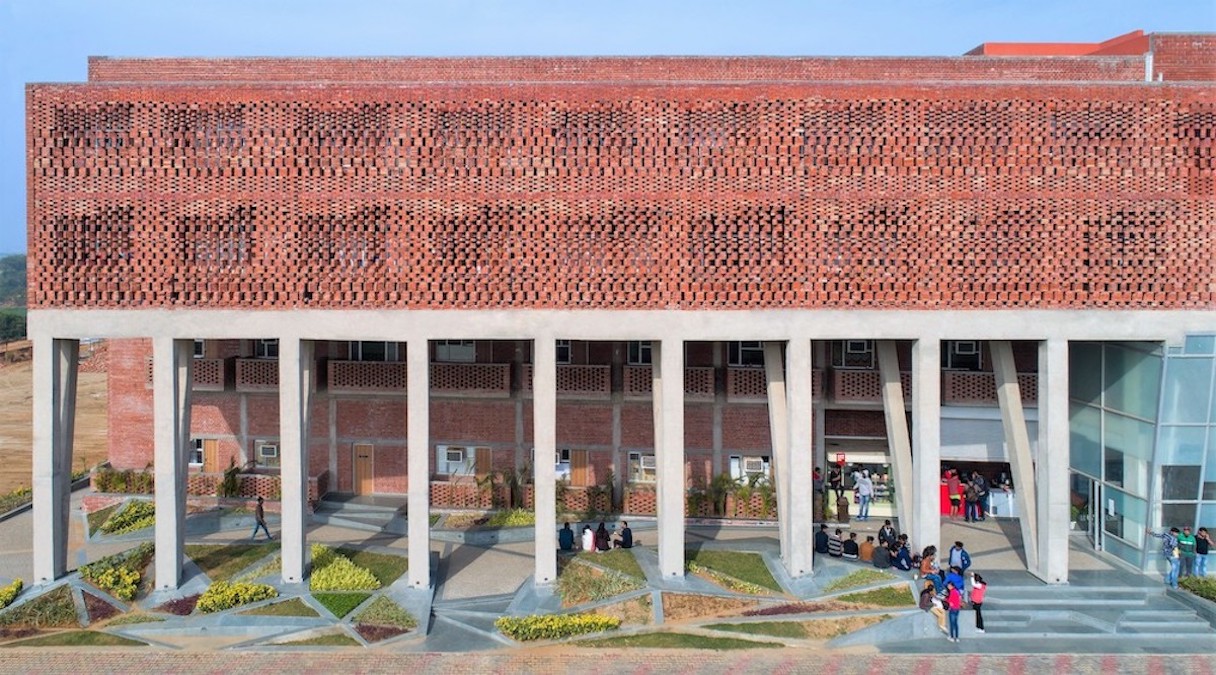
Image: St. Andrews Institute of Technology and Management, Gurgaon
Vision of the Department
“To become a leading department in creating competent Computer Engineering professionals with an emphasis on research and professional ethics.”
Mission of the Department
M1: To create a nurturing educational environment by employing effective teaching and learning methods and fostering quality education.
M2: To encourage research, consultancy & growth by impactful collaboration between Industry and Academia.
M3: To equip students with essential interpersonal skills, professional ethics and leadership ability to excel in the corporate world and contribute to society.
What is Computer Science Engineering? An Insight into the Future of technology.
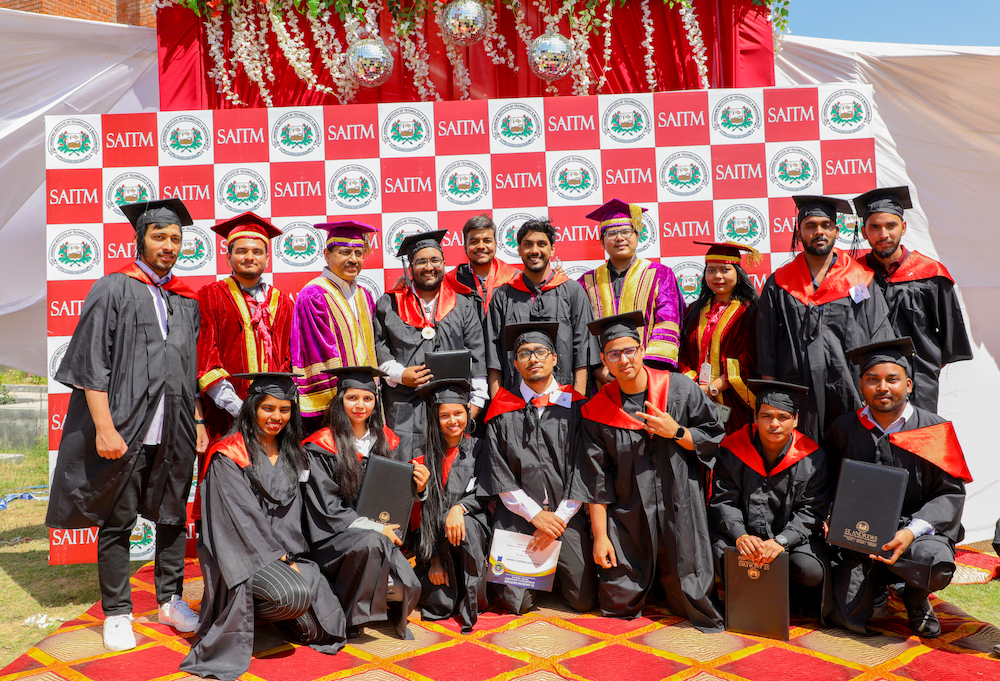
Image: Convocation Ceremony at SAITM Campus
In the era of digital transformation, Computer Science Engineering (CSE) stands as a cornerstone, shaping the future of technology. Bridging the gap between theoretical computer science and practical engineering, CSE has emerged as a vital discipline in the modern world.
Computer Science Engineering
Computer Science Engineering is an integrated field of study that combines elements of computer science to develop and enhance computer systems. It involves designing and managing hardware and software processes, ensuring efficient and innovative solutions in technology. CSE encompasses a broad range of topics, from algorithmic processing and computer architecture to software engineering and networking.
The Scope of Computer Science Engineering
The scope of Computer Science Engineering is vast and ever-expanding, given the relentless pace of technological advancements. With a B.Tech degree in CSE, graduates can explore numerous pathways in both the tech industry and academia.
Key areas include:
- Software Development: Designing and creating software applications tailored to specific needs.
- Artificial Intelligence and Machine Learning: Developing systems that mimic human intelligence to perform complex tasks.
- Data Science and Analytics: Analyzing large datasets to derive meaningful insights and inform decision-making.
- Cybersecurity: Protecting systems and networks from digital attacks.
- Cloud Computing: Managing and delivering services over the internet, enhancing scalability and accessibility.
- Blockchain Technology: Innovating in areas of secure and decentralized data management.
Revolutionize Your Career with the Comprehensive B.Tech CSE Course
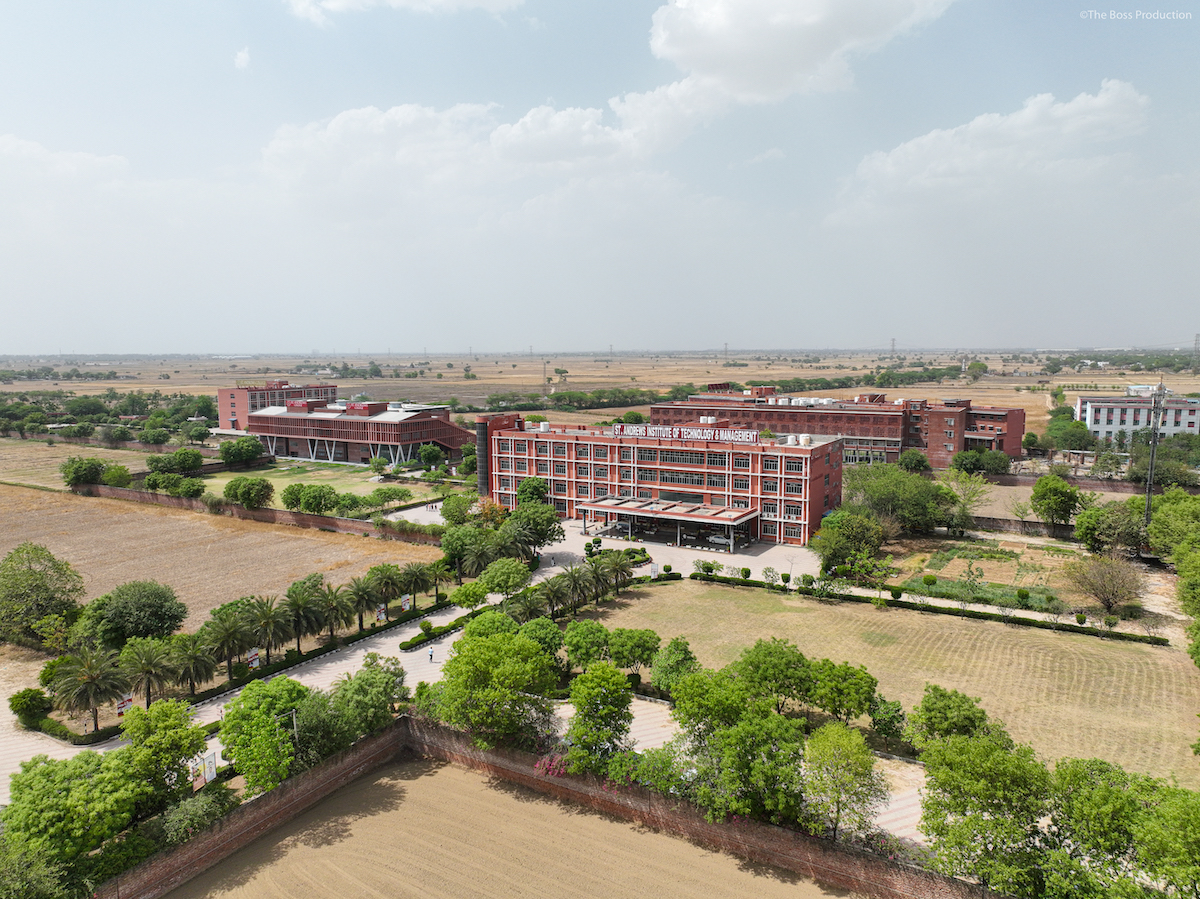
Image: SAITM Campus
Typically, a B.Tech in CSE spans four years of full-time study, divided into eight semesters. The curriculum is carefully structured to blend theoretical knowledge with practical experience, ensuring that graduates are well-prepared for the demands of the tech industry.
Core Subjects
-
Programming Languages: Students learn languages like C, C++, Java, Python, etc., to solve complex problems.
-
Data Structures and Algorithms: This subject is the backbone of computer science, teaching students about efficient data organization and manipulation.
-
Database Management Systems (DBMS): Focuses on the design and management of databases, crucial for data storage and retrieval.
-
Operating Systems: Provides an understanding of how operating systems function, manage resources, and provide services.
-
Computer Networks: Covers the fundamentals of networking technologies, protocols, and network architecture.
-
Software Engineering: Teaches software development methodologies and project management.
Elective Subjects
Electives allow students to specialize in areas of interest such as
- Artificial Intelligence,
- Machine Learning,
- Cybersecurity,
- Cloud Computing, and more.
These subjects cater to the rapidly changing demands of the tech industry and emerging global trends
Practical Exposure
-
Labs: Hands-on sessions in computer labs to reinforce theoretical concepts.
-
Projects: Students undertake various projects, often in teams, to develop software solutions for real-world problems.
-
Internships: Many programs encourage or require internships, providing students with valuable industry experience.
Unveiling the Timeline: B.Tech CSE Course Duration
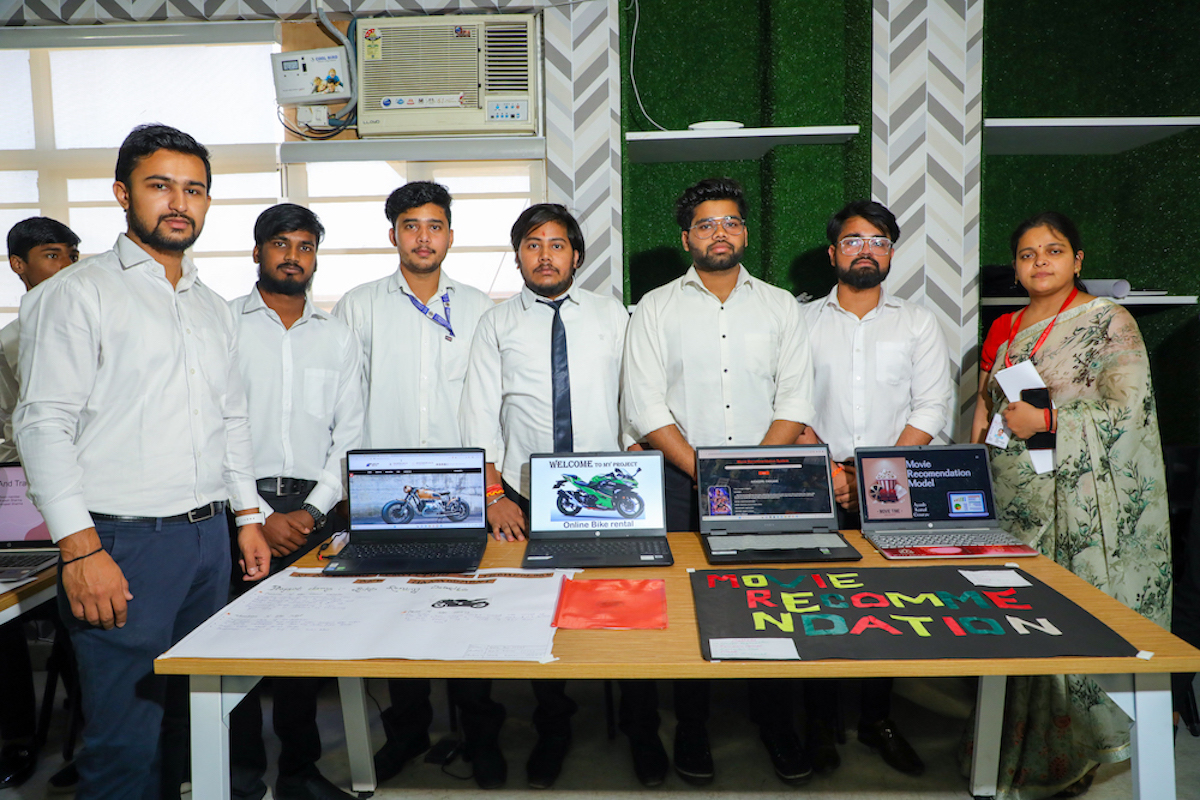
Image: Project Competition
- The Bachelor of Technology in Computer Science and Engineering (B.Tech CSE) is a comprehensive and dynamic program tailored for aspiring tech enthusiasts. Spanning over four years (8 semesters), this undergraduate course delves into the intricacies of computer science and modern engineering principles.
- Each academic year consists of two semesters, making the B.Tech CSE program a detailed journey into the world of computing, programming, and technological innovation. The curriculum is meticulously designed to align with industry trends and demands, ensuring graduates are well-equipped for the evolving tech landscape.
- With a blend of theoretical knowledge and practical application, this course is the cornerstone for building a successful career in the technology sector. Ideal for students with a passion for computer science, the B.Tech CSE course duration of four years is a gateway to numerous opportunities in the tech world.
Discover Excellence: Why Choose St. Andrews B.Tech CSE
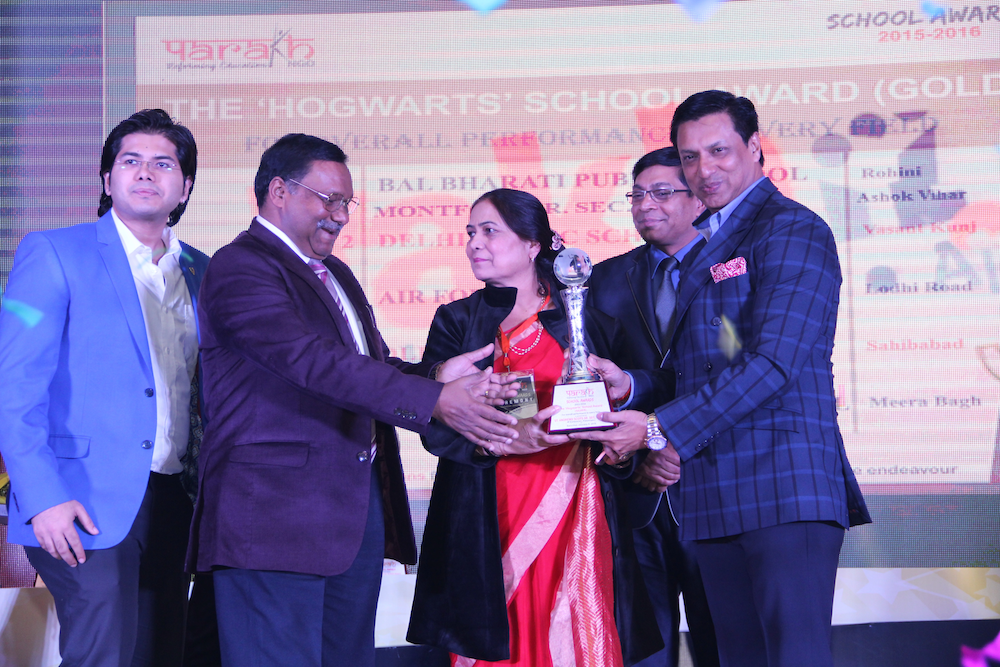
Image: Best Institution Award
- Choosing the BTech CSE course at St. Andrews Institute of Technology & Management (SAITM) in Gurgaon offers a multitude of advantages for aspiring engineers. The institute, renowned for its exceptional placement record, boasts the highest placement offer of Rs. 40 Lacs, highlighting the lucrative career prospects for its graduates. Additionally, SAITM's reputation in Delhi NCR for student excellence reflects its commitment to nurturing top-tier talent.
- With over 30 years of experience in the education sector, SAITM has established itself as a cornerstone of quality education and skill development. The institute's infrastructure is a blend of modernity and comfort, featuring over 30 hi-tech labs equipped with the latest technology, enabling students to stay ahead in the fast-evolving field of computer science.
- The state-of-the-art campus is not only air-conditioned but also a hub of vibrant events and fests, offering a holistic educational experience. The proven track record of successful placements is a testament to the institute's focus on career readiness and industry relevance.
- SAITM's affiliations and accreditations, including AICTE approval, affiliation to MDU Rohtak, an NAAC A+ rating, assure students of a high standard of education. The low fee structure, supported by industry-funded non-profit initiatives, makes this quality education more accessible.
- Lastly, the sprawling 22+ acres of lush green campus provides an ideal learning environment, balancing academic rigor with a serene and nature-friendly setting.
Explore Cutting-Edge B.Tech CSE Specializations Today!
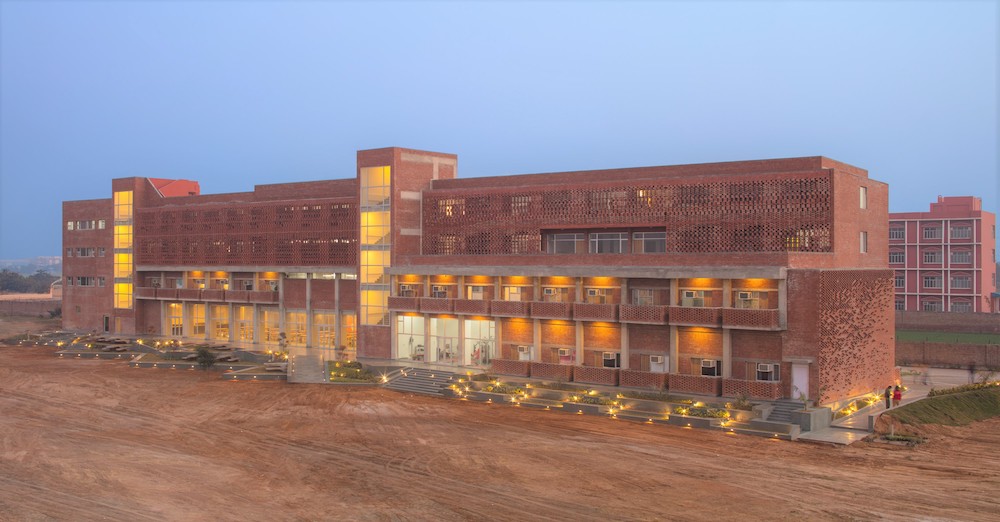
Image: SAITM Boys Hostel
The field of Computer Science Engineering (CSE) has rapidly evolved, becoming a cornerstone of the modern technological landscape. With the growing demand for innovation and expertise, Bachelor of Technology (B.Tech) in CSE has expanded to include a variety of specializations. These specializations allow students to focus on specific areas of interest, opening doors to numerous career opportunities.
Specializations in B.Tech CSE and their relevance in today's tech-driven world:
- Artificial Intelligence and Machine Learning: This specialization equips students with skills in designing intelligent systems that can learn and make decisions. It covers areas like neural networks, natural language processing, and predictive analytics. Graduates often find opportunities in tech giants, research institutions, and startups focusing on AI and ML solutions.
- Data Science and Analytics: With the explosion of big data, this specialization is in high demand. It involves learning about data processing, statistical analysis, and visualization techniques. Professionals with these skills are sought after in industries ranging from finance to healthcare, where they can provide insights from complex data sets.
- Cybersecurity: Given the rise in cyber threats, the need for cybersecurity experts is more significant than ever. This specialization focuses on network security, ethical hacking, and cryptography. Graduates can pursue careers in various sectors, ensuring the safety and integrity of digital information
- Internet of Things (IoT): IoT is transforming how we interact with everyday objects. This specialization involves learning about sensor technologies, IoT architecture, and data management. It's an exciting field with applications in smart homes, healthcare, and urban development.
- Blockchain Technology: As the backbone of cryptocurrencies, blockchain is an emerging field. This specialization covers distributed ledger technology, smart contracts, and consensus algorithms. It offers opportunities in fintech, supply chain management, and beyond.
- Cloud Computing and Virtualization: This area focuses on cloud infrastructure, virtual networks, and data storage solutions. With businesses increasingly moving to the cloud, specialists in this field are in high demand.
Understanding the Vast Benefits of a B.Tech in Computer Science Engineering
In the rapidly evolving world of technology, a Bachelor of Technology (B.Tech) in Computer Science Engineering (CSE) stands as a beacon of opportunity and growth. This article delves into the myriad benefits of pursuing a B.Tech in CSE, illustrating why it's a wise choice for aspiring tech professionals.
|
Sector |
Roles |
|
Software Development |
Software Developer, System Analyst |
|
IT and Networking |
Network Engineer, IT Consultant |
|
Data Analytics |
Data Scientist, Business Analyst |
|
Research and Development |
AI Researcher, Machine Learning Engineer |
Table 1: Career Opportunities Post-B.Tech in CSE
Expanding Career Horizons
One of the primary benefits of a B.Tech CSE course is the vast array of career opportunities it opens up. Graduates can find roles in software development, IT consulting, data analytics, and much more. This versatility ensures that CSE graduates are in high demand across various sectors, including tech giants, startups, and even government organizations.
The CSE curriculum is designed not just to impart theoretical knowledge but to hone practical skills in areas like programming, system design, and network management. This hands-on approach prepares students for real-world challenges, fostering innovative thinking and problem-solving skills.
|
Skill Type |
Skills Developed |
|
Technical |
Programming, Machine Learning, Cybersecurity |
|
Analytical |
Data Analysis, Algorithm Design |
|
Soft Skills |
Teamwork, Communication, Leadership |
Table 2: Skill Enhancement through B.Tech CSE
High Earning Potential
A significant advantage of a B.Tech in CSE is the potential for lucrative salaries. The tech industry is known for its competitive pay scales, especially for roles in software development, data science, and AI.
Global Opportunities
The B.Tech CSE degree is globally recognized, allowing graduates to explore career opportunities worldwide. This global appeal also offers a chance to work in multicultural environments, adding to the professional and personal growth of the graduates.
Staying Ahead in a Digital World
In an era where digital transformation is key, having a B.Tech in CSE equips graduates with the knowledge to stay ahead. From understanding the latest technologies to implementing them, CSE graduates lead the charge in driving innovation.
Why B.Tech CSE Trainings are Crucial?
The tech industry is dynamic, with new technologies emerging rapidly. B.Tech CSE trainings ensure students and professionals stay abreast with these advancements. They offer practical knowledge and hands-on experience, which are essential for the application of theoretical concepts learned in classrooms.
|
Area of Training |
Description |
Benefits |
|
Programming Languages |
Learning languages like Python, Java, etc. |
Enhances coding skills |
|
Web Development |
Frontend and Backend development |
Builds full-stack capabilities |
|
Data Science & AI |
Training in machine learning, AI |
Prepares for future tech |
|
Cybersecurity |
Understanding of network security |
Essential for data protection |
|
Cloud Computing |
Training in AWS, Azure, etc. |
Expands career prospects |
Table 3: Key Areas of Training in B.Tech CSE
Types of Training Available
-
Online Courses: Platforms like Coursera, Udemy offer flexible learning.
-
Workshops and Seminars: Interactive sessions conducted by universities or tech companies.
-
Internships: Hands-on experience in a real-world environment.
-
Certification Programs: Specialized certifications in areas like cloud computing, AI, etc.
B.Tech CSE Career Paths & Top Recruiters
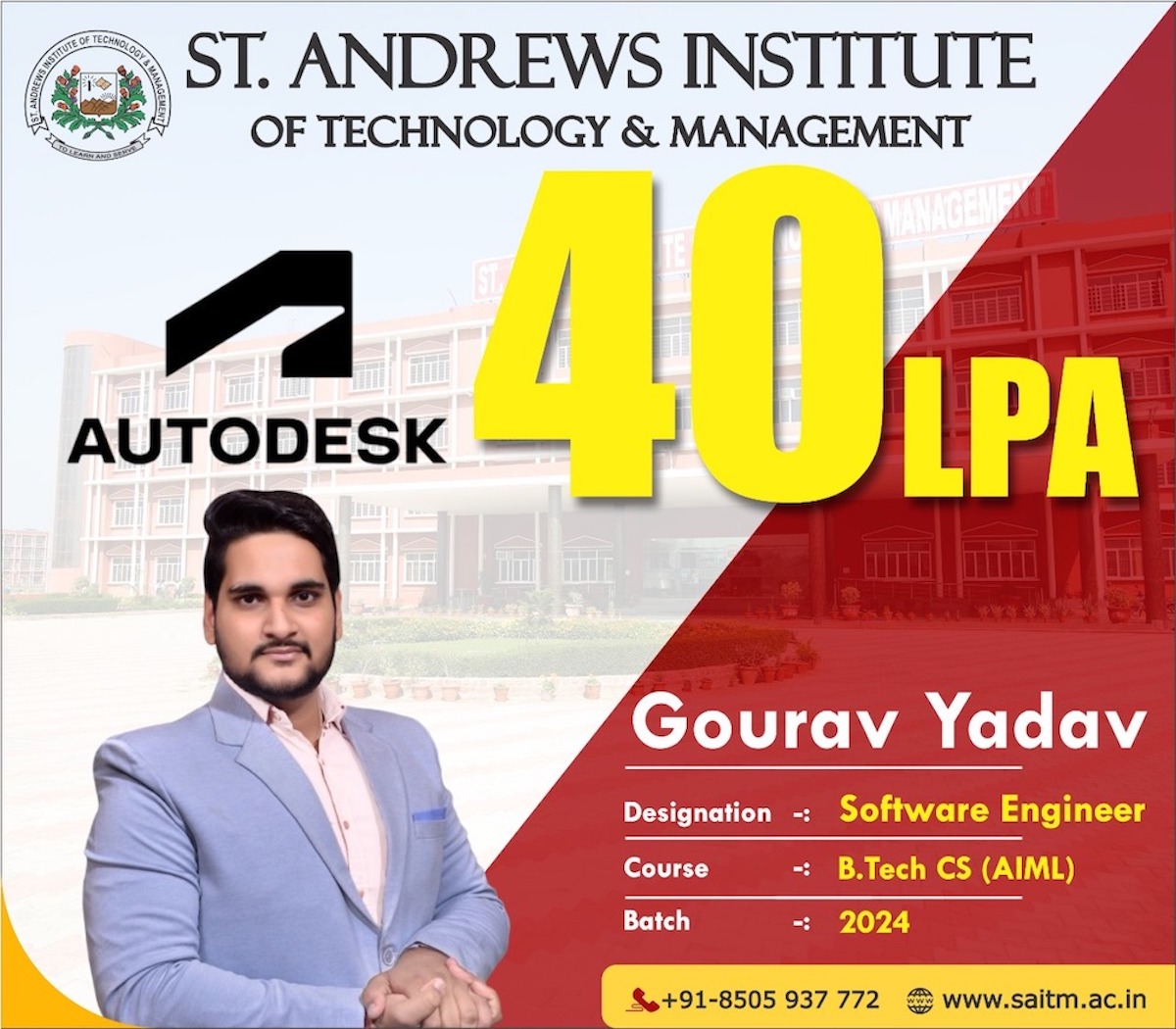
Image: Highest Package
In the dynamic realm of technology, a Bachelor of Technology (B.Tech) in Computer Science and Engineering (CSE) is more than just a degree; it's a gateway to a plethora of career opportunities. This article delves into the varied and lucrative career paths available for B.Tech CSE graduates, spotlighting key recruiters and their attractive compensation packages.
1. Software Developer/Engineer
As the backbone of the tech industry, software developers are in high demand. Responsible for designing, testing, and maintaining software systems, these professionals are sought after by giants like Google, Microsoft, and Amazon. Packages range from 4 to 50 LPA annually for starters, scaling up with experience.
2. Data Scientist
In the age of big data, data scientists are the wizards who make sense of complex data sets. They are in demand in sectors like finance, healthcare, and retail. Top recruiters include IBM, Accenture, and Deloitte, offering packages starting from 4 to 50 LPA per annum.
3. Cybersecurity Specialist
With digital threats on the rise, cybersecurity specialists are crucial. They protect organizational data from cyber attacks. Companies like Cisco, Palo Alto Networks, and Symantec lead the recruitment, offering salaries between 4 to 50 LPA.
4. AI and Machine Learning Engineer
AI and ML engineers are revolutionizing industries with their innovative solutions. Firms like NVIDIA, Intel, and IBM are prime recruiters, providing compensation ranging from 4 to 50 LPA.
5. Blockchain Developer
Specializing in blockchain technology, these developers are shaping the future of secure digital transactions. Organizations like Ripple, Ethereum, and IBM.
6. Cloud Computing Specialist
Experts in cloud services are pivotal in today's tech landscape. Amazon Web Services, Microsoft Azure, and Google Cloud Platform are key employers.
B.Tech CSE Admissions Guide
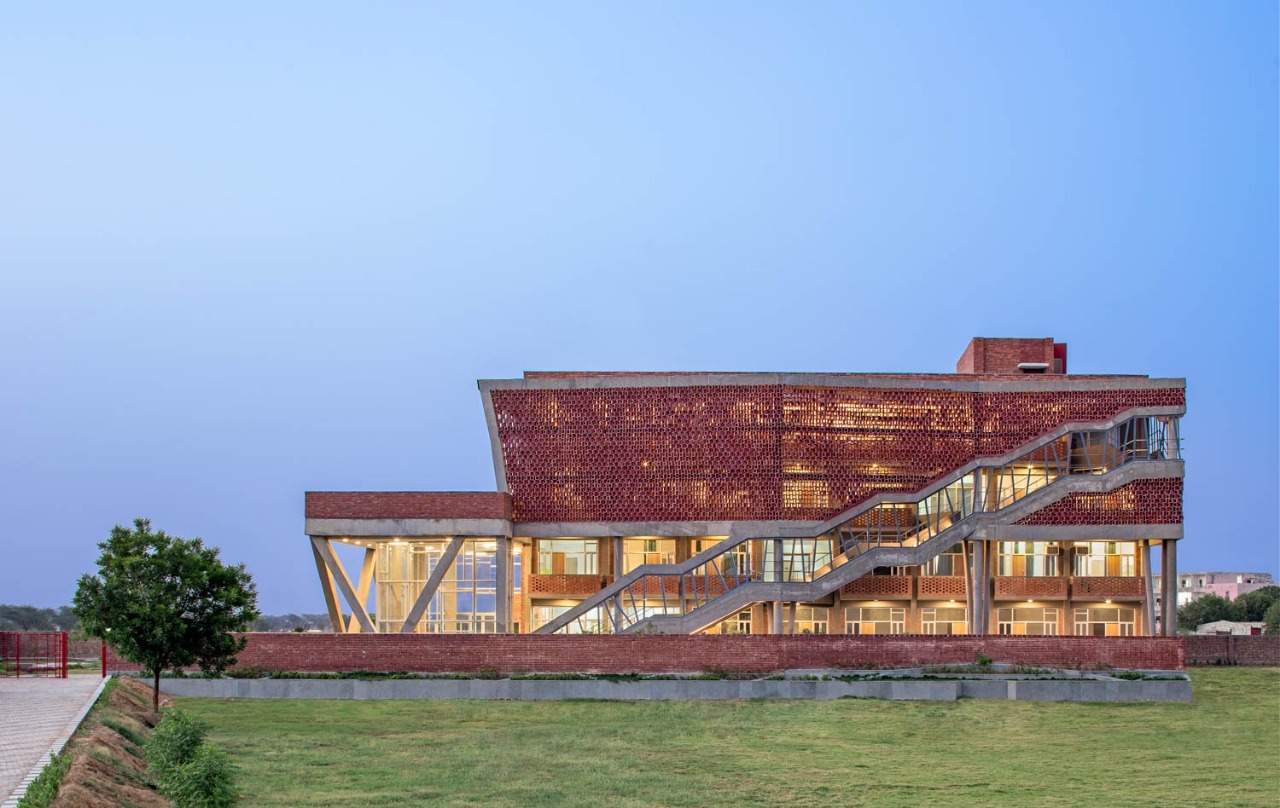
Image: SAITM Girls Hostel
In the ever-evolving world of technology, a Bachelor of Technology (B.Tech) in Computer Science Engineering (CSE) remains a coveted degree. As aspiring tech enthusiasts gear up for admissions, understanding the B.Tech CSE admission process is crucial. This article offers a detailed insight into this journey, tailored to guide you seamlessly through each step.
1. Eligibility Criteria
Before diving into the application process, ensure you meet the eligibility criteria. Typically, candidates must have:
-
Completed 10+2 with Physics, Chemistry, and Mathematics.
-
Secured a minimum aggregate score (usually 50-60%) in these subjects.
-
Qualifying marks in national or state-level engineering entrance exams.
2. Entrance Exams: Your Gateway
Entrance exams are pivotal in the B.Tech CSE admission process. Key exams include:
|
Exam Name |
Conducting Body |
Application Period |
|
JEE Main |
NTA |
Dec-Jan |
|
JEE Advanced |
IITs |
Post JEE Main |
|
State-level Exams |
Various |
Varies |
Table 4: Entrance Exams for B.Tech CSE
Preparation for these exams involves rigorous study, mock tests, and time management skills.
3. Choosing the Right Institute
After cracking the entrance exams, the next step is selecting the right institute. Consider factors like:
-
Academic reputation
-
Placement records
-
Faculty expertise
-
Campus facilities
-
Alumni network
4. Application Process
The application process generally involves:
-
Online form submission on the institute's website.
-
Uploading necessary documents (mark sheets, entrance exam scores, etc.).
-
Paying the application fee.
Stay vigilant about application deadlines to avoid last-minute hassles.
5. Counseling and Seat Allocation
Most institutes conduct counseling sessions for seat allocation. This process is often based on:
-
Entrance exam rank
-
Preferences filled by the candidate
-
Reservation Policies
6. Final Steps: Admission and Enrollment
Once allotted a seat, complete the final steps:
-
Document verification
-
Fee payment
-
Enrollment formalities
B.Tech CSE Eligibility Criteria in India
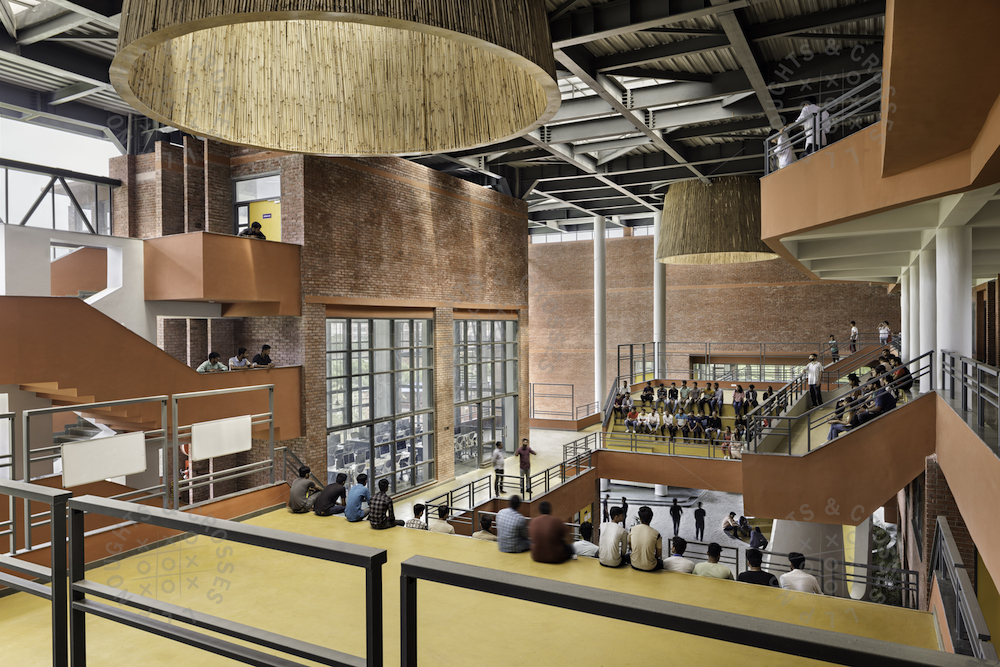
Image: St. Andrews Academic Block
The field of Computer Science Engineering (CSE) has emerged as a cornerstone in the ever-evolving technological landscape. A Bachelor of Technology (B.Tech) in CSE offers a gateway to the world of innovation and digital advancement. This article serves as a comprehensive guide to understanding the eligibility criteria for B.Tech CSE in India, tailored for aspiring students eager to make their mark in the tech industry.
Eligibility Overview
The eligibility criteria for enrolling in a B.Tech CSE program in India are primarily twofold: educational qualification and entrance examinations.
Educational Qualification
|
Criterion |
Description |
|
Academic Background |
Candidates must have completed their 10+2 or equivalent examination from a recognized board. |
|
Mandatory Subjects |
Physics, Chemistry, and Mathematics are compulsory subjects. |
|
Minimum Marks |
A general benchmark is a minimum of 60% aggregate marks, although this varies among institutions. |
Table 5: Educational Qualification for B.Tech CSE
Entrance Examinations
|
Exam Name |
Details |
|
JEE Main |
A national-level exam, serving as a prerequisite for JEE Advanced and various state-level and private engineering colleges. |
|
JEE Advanced |
Required for admission into IITs, and some other institutions. |
|
State-Level Exams |
Various states conduct their own entrance exams. |
|
University-Specific Exams |
Some universities hold their own exams. |
Table 6: Entrance Examinations
Age and Nationality
There is often an age limit, typically 17-25 years at the time of admission. However, age relaxations exist for certain categories. Candidates must be Indian nationals, though many institutions have seats reserved for foreign nationals, NRIs, and PIOs.
Additional Criteria
Our college have additional criteria like:
-
Lateral Entry: For diploma holders in engineering, allowing direct admission to the second year.
-
Quotas: Reservation for SC/ST/OBC, women, physically challenged, etc.
A Comprehensive Guide to B.Tech CSE Entrance Exams in India
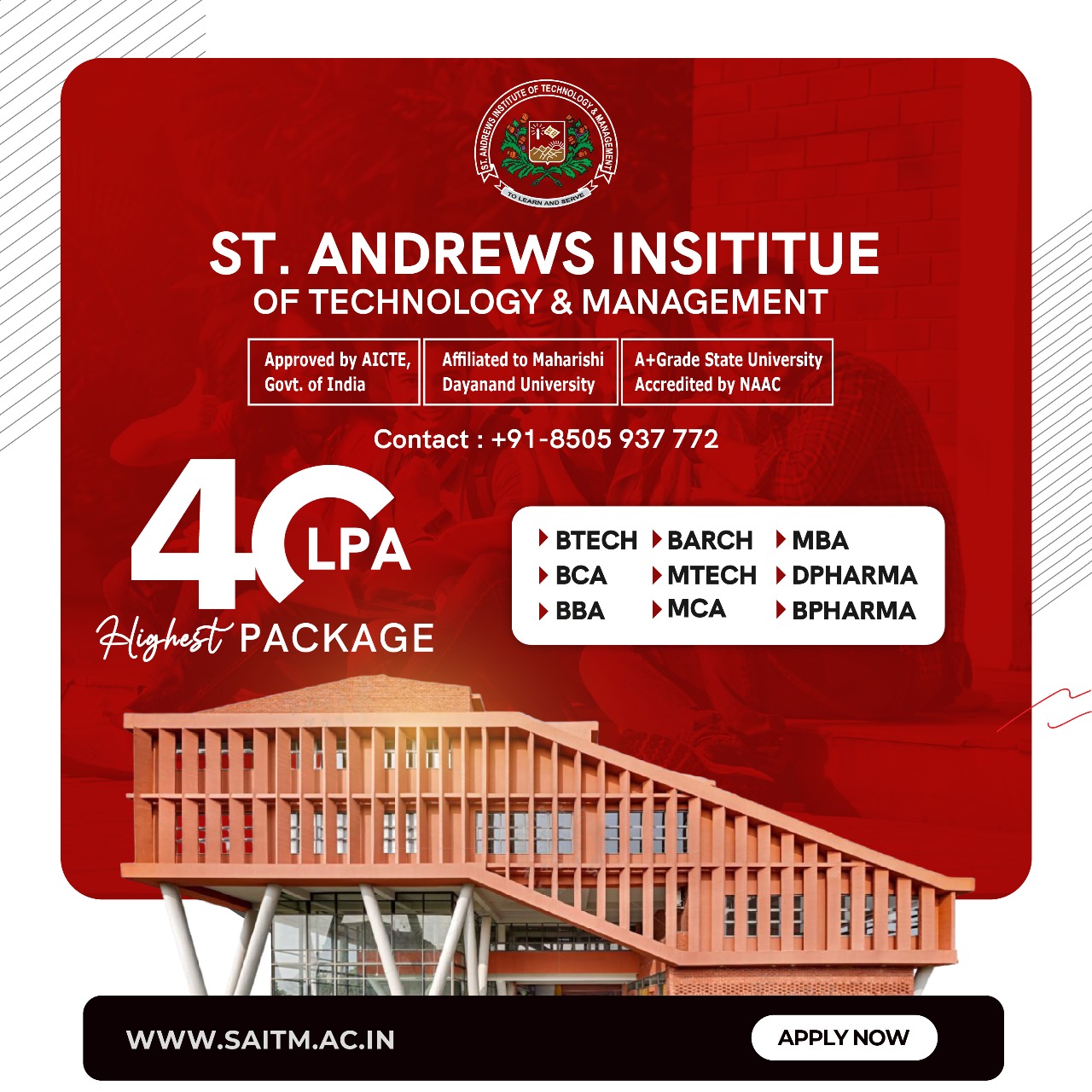
Image: SAITM Campus New Block
In the realm of higher education, Bachelor of Technology (B.Tech) in Computer Science Engineering (CSE) is a coveted choice for students aiming to establish a career in the ever-evolving field of technology. With the digital era's rapid progression, a degree in CSE offers lucrative career opportunities and a platform to contribute significantly to technological advancements. In India, gaining admission into a prestigious institution for B.Tech in CSE requires navigating through various entrance examinations. This article provides a detailed overview of these entrance exams, offering aspiring students a roadmap to their dream colleges.
1. Joint Entrance Examination (JEE) Main and Advanced
JEE Main is the primary gateway for students seeking admission to undergraduate engineering programs at national institutes like NITs, IIITs, and other centrally funded technical institutions. The top performers in JEE Main are eligible to appear for JEE Advanced, which opens doors to the esteemed Indian Institutes of Technology (IITs).
|
Exam Name |
Conducting Body |
Exam Mode |
Application Period |
Exam Date |
|
JEE Main |
NTA |
Online |
Dec-Jan |
April |
|
JEE Adv. |
IITs |
Online |
May |
June |
Table 7: JEE Main and JEE Adv. Entrance Exams
2. State-Level Exams
Several states conduct their own entrance exams for admissions in engineering colleges within the state. Some notable ones include Maharashtra's MHT-CET, Karnataka's KCET, and West Bengal's WBJEE.
|
Exam Name |
Conducting Body |
State |
|
MHT-CET |
DTE Maharashtra |
Maharashtra |
|
KCET |
KEA |
Karnataka |
|
WBJEE |
WBJEEB |
West Bengal |
Table 7: State Level Entrance Exams
Preparation Tips:
-
Understand the Exam Pattern: Familiarize yourself with the exam format, types of questions, and marking scheme.
-
Comprehensive Study Material: Utilize NCERT books for basics and advanced reference books for in-depth understanding.
-
Regular Practice: Solve previous years' papers and take mock tests.
-
Time Management: Develop a strategic approach to manage time effectively during the exam.
Career Opportunities for CSE Graduates
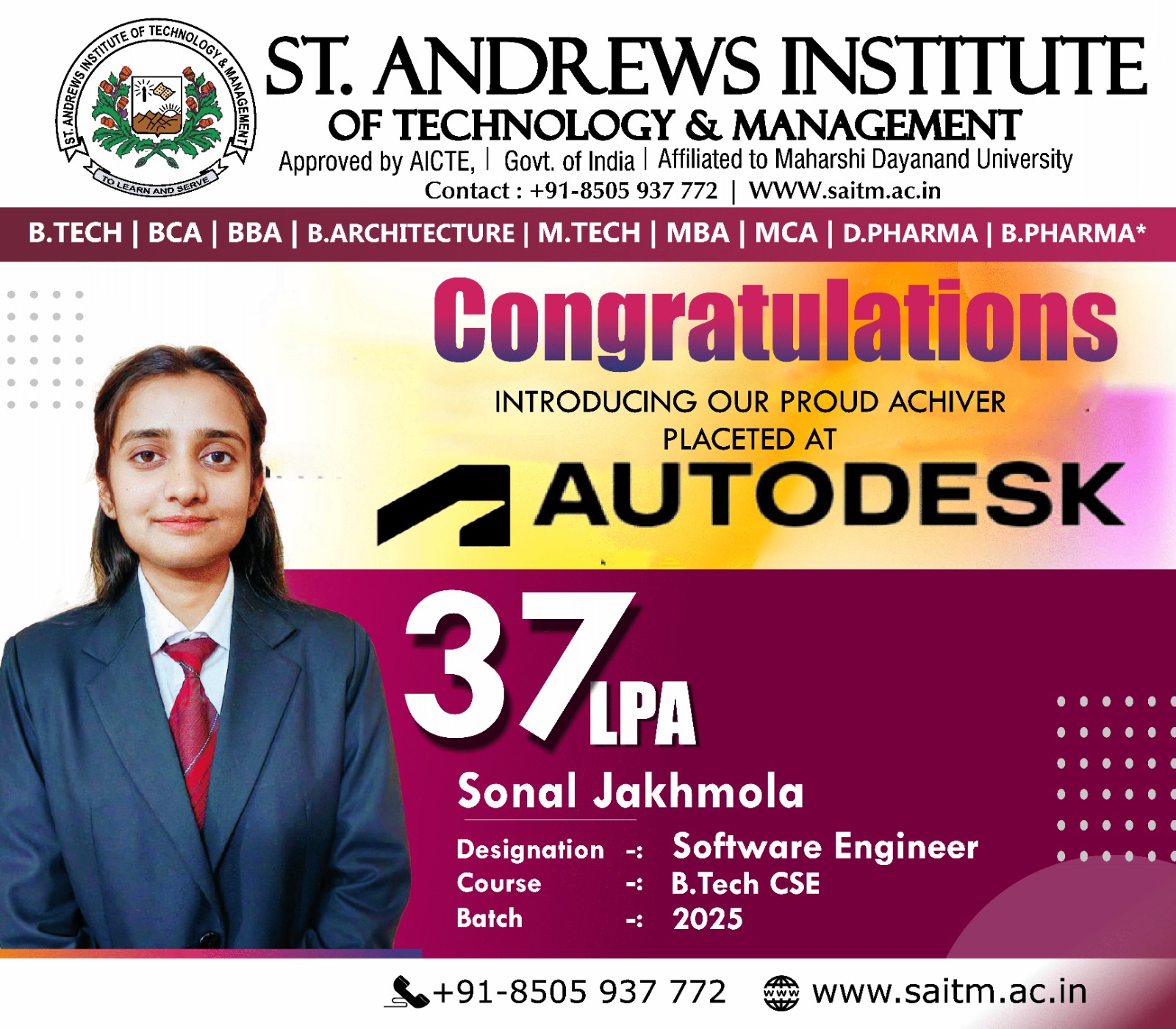
Image: B.Tech CSE Student Placed as a Software Engineer
Graduates with a B.Tech in Computer Science Engineering have a plethora of career options:
-
Software Engineer: Developing and maintaining software applications.
-
Data Scientist: Analyzing complex data to provide actionable insights.
-
Systems Analyst: Designing optimal solutions for business IT systems.
-
Network Architect: Designing and implementing computer networks.
-
Cybersecurity Expert: Protecting information systems against cyber threats.
B.Tech - Computer Science & Engineering Overview
Eligibility
-
Minimum aggregate of 45% in Physics, Mathematics and Any one Chemistry/Biology /Inf T.ech./Comp.Science/EGD in 12th Standard or D.Voc., Diploma in Eng.3year
Contact Admission Cell
Objectives Outcomes
Program Educational Objectives (PEOs)
PEO 01: Empowered with robust technical competence in Computer Science & Engineering, enabling them to analyze, design, and develop innovative solutions for complex real-world problems, and prepare them for careers in research, academia, entrepreneurship, software development, cybersecurity, and related fields.
PEO 02: Showcase a commitment to professional ethics and interpersonal skills, inculcate leadership, equipping them to excel in the corporate world by effectively communicating, collaborating in diverse teams, and adapting to evolving industry demands, ultimately contributing positively to their organizations and society.
PEO 03: Embody a commitment to lifelong learning and innovation, ready to engage in research, explore emerging technologies, and adapt to rapid advancements in Computer Science, ultimately contributing to technology's growth and positively impacting their communities, fostered by a strong foundation in research and industry collaboration.
Program Outcomes (PO)
1. Engineering knowledge: Apply knowledge of mathematics, science, engineering fundamentals, and an engineering specialization to the solution of complex engineering problems.
2. Problem analysis: Identify, formulate, review research literature, and analyze complex engineering problems reaching substantiated conclusions using first principles of mathematics, natural sciences, and engineering sciences.
3. Design/development of solutions: Design solutions for complex engineering problems and design system components or processes that meet specified needs with appropriate consideration for public health and safety, and the cultural, societal, and environmental considerations.
4. Conduct investigations of complex problems: Use research-based knowledge and research methods including design of experiments, analysis and interpretation of data, and synthesis of the information to provide valid conclusions.
5. Modern tool usage: Create, select, and apply appropriate techniques, resources, and modern engineering and IT tools including prediction and modeling to complex engineering activities with an understanding of the limitations.
6. The engineer and society: Apply reasoning informed by the contextual knowledge to assess societal, health, safety, legal and cultural issues and the consequent responsibilities relevant to the professional engineering practice.
7. Environment and sustainability: Understand the impact of the professional engineering solutions in societal and environmental contexts, and demonstrate the knowledge of, and need for sustainable development.
8. Ethics: Apply ethical principles and commit to professional ethics and responsibilities and norms of the engineering practice.
9. Individual and team work: Function effectively as an individual, and as a member or leader in diverse teams, and in multidisciplinary settings.
10. Communication: Communicate effectively on complex engineering activities with the engineering community and with society at large, such as being able to comprehend and write effective reports and design documentation, make effective presentations, and give and receive clear instructions.
11. Project management and finance: Demonstrate knowledge and understanding of the engineering and management principles and apply these to one’s own work, as a member and leader in a team, to manage projects and in multidisciplinary environments.
12. Life-long learning: Recognize the need for, and have the preparation and ability to engage in independent and life-long learning in the broadest context of technological change.
Program Specific Outcomes (PSOs)
PSO 01: Develop and administer a suitable computing system using fundamental knowledge of computer architecture, organization, embedded systems and networking.
PSO 02: Develop Software Systems using software engineering principles and database design principles.
Career Opportunities
Software Application Developer
Web Developer
Computer System Analyst
Network System Administrator
Software System Developer
Database Administrator
Computer Hardware Engineer
Computer Science Blogger
Technical Training
-

WEB DESIGNING
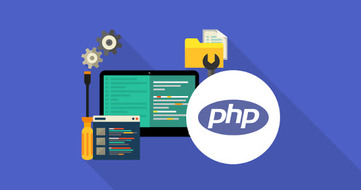
PHP
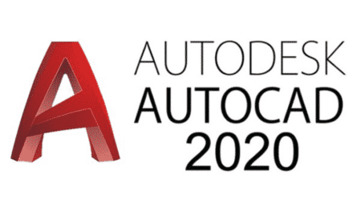
AUTOCAD 2020
Testimonials
What students have to say about us
-

SAITM has played a pivotal role in shaping both my academic and professional...
Praveen Kumar
Web Developer @ SAITM
SAITM has played a pivotal role in shaping both my academic and professional journey. As a B.Tech CSE student, I have not only received a high-quality education but also gained invaluable hands-on experience. Transitioning from classroom learning to working as a Software & Web Developer for the college itself has been an incredibly empowering experience. SAITM is more than just an academic institution—it's a place that identifies talent, believes in its students, and nurtures them into confident professionals.
Praveen Kumar
Web Developer @ SAITM
-

Situated in between the green grasslands of Gurugram, the campus has to...
Sukaran
Situated in between the green grasslands of Gurugram, the campus has to offer a lot in all aspects be it exposure, placements, extra-curricular and the right environment to prepare you for the corporate life ahead. Infrastructure is undoubtedly one of the best. Lively Culture and Campus Life Huge participation in inter college and corporate competitions Great Ecosystem.
Sukaran
-

The placement is good. The placement rate is close to 78%. Good companies do...
Ishan Mukherji
The placement is good. The placement rate is close to 78%. Good companies do visit here. The placement officer here is a very good man and do help us very much in the placements. Tech and non tech both companies visit campus for every Interested students.
Ishan Mukherji
-

SAITM is my second home. I have built great relationships with classmates...
Lakshay Sethia
SAITM is my second home. I have built great relationships with classmates and faculties. Being at SAITM has been an amazing experience for me that has helped me grow personally and professionally as I got multiple job offers from top class multi national companies like Skolar, Decimal Technologies, Akash+Byju's and NIIT.
Lakshay Sethia
-
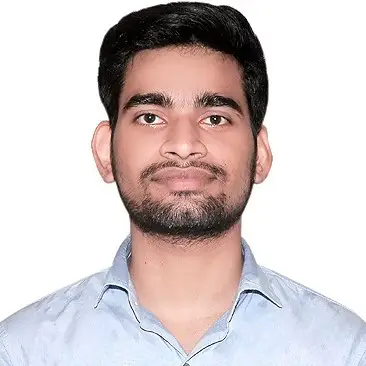
I have had a very good experience at SAITM. The campus environment and...
Prashant Jha
I have had a very good experience at SAITM. The campus environment and class schedule are very convenient. The hands on teaching style provides good learning opportunities which helped me to bagged the campus placement offer from TCS.
Prashant Jha
Corporates where placement opportunity was given
Download Placement Report

Our Top Recruiters
Frequently Asked Questions
1. How do I register for orientation?
A link will be sent to you on your email and registered phone no. Students have to fill the form through that link and a confirmation call will be given by the college to all the students who have registered.
2. Is any financial support given to the students who enroll?
Scholarships are being provided to eligible students. The details are mentioned in the scholarship column.
3. How to get an education loan?
The college (SAITM) steps forward to support students by providing all the documents required from the college/University for issuing of loan from any bank.
SAITM has collaborations with the State Bank of India & Punjab National Bank for the same. Many NBFC's are also availaable for education loan at SAITM.
4. What kind of Scholarships are available?
Scholarships are provided on the following basis:
- Class XII marks (percentage). A slab has been made and scholarships are given in the form of fee waiver seats at the time of admission to the students.
- Cash scholarships are given to the university rank-holders from time to time.
- Scholarships are given to the students belonging to SC, ST, and OBC as per state/central government policies.
5. Why SAITM is charging lower fees as compared to other private institutions?
SAITM is in the education sector for 28+ years and understands the importance of education. We cater to the need of society by graduating young minds who cannot afford higher fees as per the mission of SAITM.
6. Fee structure of B.Tech?
The fee payable for B.tech is INR 52,500/- per semester.
7. Fee structure of BBA & BCA?
The fee payable for BBA is INR 41,000/- per semester.
The fee payable for BCA is INR 41,000/- per semester.
8. What are the job prospects in B.Tech?
Quality engineers are in high demand everywhere and in every sector be it banking, manufacturing, or aviation, whether within our borders or abroad. As the growth pace of the IT industry is consistently high, there are several career opportunities for B.Tech graduates. India is a particularly important outsourcing hub for clients from different parts of the world. There are plenty of jobs for everyone in posts such as:
Website Developer
Software Engineer/Programmer
Software Designer
Research Analyst
9. What is better a degree or a diploma?
A degree in any specialized course opens wider career options than a diploma.
10. What is better BBA or B.com?
BBA programme provides different roles in all sectors across all the domains. B.com offers the opportunities majorly in accounts department. BBA is a professional degree course in comparison of B.com which is a normal degree course.
11. What are the job prospects in BBA?
BBA graduates can opt for roles in business management and sales. Some companies also offer roles of production supervisor, planner, and administrator to BBA graduates.
BBA graduates usually get hired by companies that are involved in the business of manufacturing, construction, retail, IT, and finance. They can also apply for various government jobs. Some of the esteemed job profiles you can attain after successful completion of BBA are:
Finance Manager
Business Administration Researcher
Human Resource Manager
Research and Development Manager
Business Consultant
Information Systems Manager
Marketing Manager
Some of the polished areas where a BBA graduate can look for employment are:
Banks
IT Firms
Marketing Organizations
Educational Institutes
Business Consultancies
Multinational Companies
Financial Organizations
Export Companies
12. What are the jobs prospects in BCA?
Students usually start as a Junior Programmer or a Software Tester and then move higher up the ranks to the role of a Senior Programmer. The IT industry is booming in India and you can find many companies with vacancies for BCA graduates.
Though the BCA program gives students good exposure to technologies, it is advisable for students to pursue MCA to give their career a wise push. After graduation, a student with a B.Tech degree has greater job opportunities than a student with a BCA. Still, junior programming positions and software testing jobs are available to BCA graduates and from there, students can climb up.
13. How to enroll for admission at SAITM?
Students can enroll for admission at SAITM by filling an application form. Students can either apply online or offline. The details are available on the admission page.
14. What scholarships are provided at SAITM?
Scholarships are provided on the following basis:
- Class xii marks (percentage). A slab has been made and scholarships are given in the form of fee waiver seats at the time of admission to the students.
- Cash scholarships are given to the university rank-holders from time to time.
- Scholarships are given to the students belonging to SC, ST, and OBC as per state/central government policies.
15. What is the eligibility criteria for B.Tech?
10+2 with Physics and Mathematics as compulsory subjects along with one of the following subjects: (a) Chemistry (b) Bio-Technology (c) Biology/ Technical Vocational subject and minimum 45% aggregate marks from a recognized board/university.
16. What is the eligibility for criteria BBA & BCA?
10+2 with 50% aggregate marks from a recognized board. (48% marks for SC/ST candidates of Haryana only) in BBA
10+2 with 45% aggregate marks from a recognized board. (42.75% marks for SC/ST candidates of Haryana only) in BCA
17. Difference between BCA & B.sc (computer science)?
BSc Computer Science is more concept-oriented while BCA is application-oriented. BCA course will teach you about emerging technologies and their applications while giving you a basic idea of commonly used programming languages. However, the B.Sc (CS) course would focus more on theoretical concepts.
18. What is difference between B.Tech & B.E?
The B.Tech. program is more practical-oriented than the BE program which is more theoretical. B.E. is more associated with theoretical ideas and principles, while B. Tech. is more focused on the practical implementation of those theories. However, the curriculum for B.E. and B.Tech courses offered by different engineering colleges and institutes is more or less the same. Employers place equal importance on both degrees.
19. What after 12th BBA or BCA?
Students should choose the UG program as per their interests. Students who are interested in management studies should opt for BBA and those who are more into technologies should choose BCA.
20. Which is better BCA or B.Tech?
Both are professional UG programs and have their own importance. BCA is a 3-year degree program whereas B.Tech is a 4-year degree program. BCA mainly focuses on the study of computer applications whereas B.Tech has several specializations and the area of study depends on the chosen stream.
21. Who will address the orientation?
The respectable fraternity of the corporates is invited to address the orientation. They motivate and guide the newly enrolled students for their future. They ignite the passion in the students’ minds towards their future goals.
22. How will I get all the information regarding orientation and commencement of the session?
All the information about orientation and other events conducted in the college is provided to the students and parents from time to time via mail, calls, and text messages on their registered contact numbers provided by the students at the time of admission.
23. Does orientation costs anything me to?
No, there are no charges for attending the Orientation Ceremony at SAITM for the enrolled students. Parents are also invited for the same.
24. Is it mandatory to attend orientation?
Yes, it is mandatory to attend the orientation that takes place before the start of an academic year at the institution. A variety of events are held to orient and welcome new students. On this day, students get to know more about the college, events, and facilities provided by the college.
25. Can I choose my session date or change as per my reservations?
The session date is decided in advance and students are informed about the same through various modes such as mail, call, text message a month before. Hence, the students are advised to make reservations according to the dates given by the college.
26. Fee structure of MBA?
The fees payble for MBA is INR 2,64,000/- for 2 years.
27. What are the job prospects in MBA?
MBA/Global MBA opens the diversity opportunities to work in various sector. These opportunities can be in the domain of:
- Marketing : Channel Management, Retail Management, Market Research, Digital Marketing, Media Sales, Pre Sales.
- HR : HR Analytics, Talent Acquisition, HR Business Partner, Compensation and Reward Management, Industrial Relations and Labour Laws.
- Finance : Investment Banking, Equity Research, Commercial Credit, Corporate Finance, Finance Quality Management
- Business Analytics
28. How to enrol for admission in Global MBA Program at SAITM?
Steps of enroling for Global MBA program at SAITM:
- Filling up Application form
- Appearing for personal interview round
- Final Selection
- Paying registration fees Rs.25000/- within 7 days of getting admission call
29. What is the eligibility criteria for MBA?
Graduation from UGC recognised university with 50% aggregate marks. 47.5% marks in case of SC/ST candidate.
30. What are the salient features of Global MBA Program?
Salient Features:
- Approved by AICTE and affiliated to MDU, NAACA+
- Grooming Professionals for Industry 4.0
- Global connects for career tracks in new-age areas.
- Dual Specialization
- Domain specialist FacultyTechno - Managerial - Content
- Curriculum with cutting-edge technology
- Profile Based Training
- 8 Value Added Certifications with 6 Core Certifications
- Seminars/Workshops
- Live ProjectsPaid Winter/Summer Internship/OJT
- 100% International Placement Assistance
- High ROI
- Art of Infrastructure with Cutting Edge Creativity
31. What are the advantages of Global MBA?
Advantages of Global MBA:
- Immersion Program to Dubai
- Free Personal Laptop
- Mentoring by International industry professionals
- Foriegn Language classes
- international Placement opportunities
- Value added training Certifications & Workshops
32. Details of Value Added Training Certifications & Workshops in Global MBA?
Value added training Certifications & Workshops in Global MBA:
- Microsoft Package (Basic & advance Excel)
- Data Visualization
- Digital marketing
- Certification in Wealth management & Financial planning
- Financial Derivatives
- personality Grooming and Image Building
- Aptitude
- Recruitment Process
- SAP / ERP
View All Top Recruiters
AMAZON (AWS_CLOUD SUPPORT ASSOCIATE) 19 LPAAMAZON (OPERATIONS)APEX TG INDIA PVT. LTD.ARYSON TECHNOLOGIESASPIRING MINDS ASSESSMENTS PVT. LTDAVIS E SOLUTIONSAVL INDIA PVT LTDBAR CODE INDIA LIMITEDBIRDS SOFTWARE SERVICES PVT LTDBITCSBOOKMYFOREXCAPGEMINICARDEKHO.COM (GIRNARSOFT)CENTILYTICSCHEGG INDIA PVT. LTD.CLOUD ANALOGY (IT SERVICES)CLOUD ANALOGY (SALES)COGNIZANT PATCOLLEGEDUNIACVENTDAFFODIL SOFTWARE PVT. LTD.DIGITAL WEB ANALYTICS AND OPTIMIZATIONDXC TECHNOLOGYE2E RESEARCH PVT LTDECKOVATIONEDU-TOTALENTAB INFOTECH PVT LTDENTRANCEZONEERNST & YOUNGESDC SOFTWARE SOLUTION PVT LTDFIELDASSISTFLAT AND KEYSFLIPKART PVT. LTD.GLOBUS EIGHTGOMECHANICGRAPECITYGREAT DEVELOPERS INFOTECH PRIVATE LIMITEDHABILELABS PVT. LTD.HANU SOFTWAREHARMAN KARDONHSBC SOFTWARE DEVELOPMENT (INDIA) PVT. LTDIDP EDUCATIONIN TIME TECINDUS VALLEY PARTNERSINFOSYSINNOSTAXINNOVATIONMINTIMETEC VISIONSOFT PVT LTDJARO EDUCATIONJELLYFISH TECHNOLOGIESJOSH TECHNOLOGY / CALYXPOD TALENT SOLUTIONS PVT. LTD.JUST DIALKMG IT PVT LTDKNOLDUSKPMGLEAP LEARNER, INDIALIDO LEARNINGMEDIOLOGY SOFTWARE PVT LTDMN TECHNIQUE LTDMOBIKWIKMOTHERSONSUMI INFOTECH & DESIGNS LIMITEDNIIT TECHNOLOGIESNINELEAPSNIXXIT IT SOLUTIONSNUCLEUS SOFTWARENUTRITAP TECHNOLOGIESNXTLIFE TECHNOLOGIESPLANIFY CONSULTANCY INDIA PRIVATE LIMITEDPOLESTARPUBLICIS SAPIENTRAPIDSOFT TECHNOLOGIES PVT LIMITEDRIVIGOSAAS LABSSAVANTIS INDIA PVT.LTDSERVETEL COMMUNICATIONS PRIVATE LTDSHL INDIA PVT. LTD.SKILL LOTTO SOLUTIONS PVT. LTD (SUGAL & DAMANISMARTPRIX WEB PRIVATE LIMITEDSOPRA BANKING SOFTWARESQUAREBOAT SOLUTIONS PVT LTDSTUDIO GRAPHENESUCCESSIVE TECHNOLOGIESSYSTOOLS SOFTWARE PRIVATE LIMITEDTATA CONSULTANCY SERVICES (NATIONAL QUALIFIER TEST)TECH MAHINDRATINIUS OLSENTOTALITY CORPTRAVCLAN TECHNOLOGIESTRENDY DICE TECHNOLOGY (IT SERVICES)TRENDY DICE TECHNOLOGY (SALES)URBANCLAPVINOVE SOFTWARE & SERVICES PVT. LTDW3VILLA TECHNOLOGIES PVT. LTDWUNDERMANXCEEDANCEXORLABS.COMZIGRAMZS ASSOCIATESContact Us
SAITM CollegeMOBILE NUMBER
EMAIL ID

